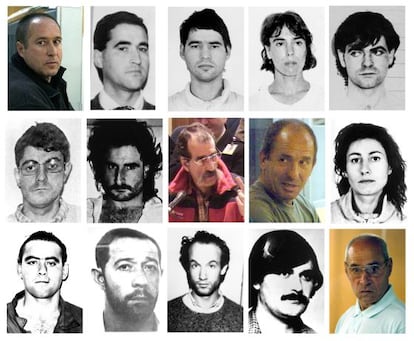Abertzale hails ECHR decision as “very good news on a human level”
Lawyers for Inés del Río to file for a further 55 ETA inmates to be freed

The political parties forming the Basque nationalist abertzaleleft on Monday called the European Court of Human Rights' decision to revoke the so-called "Parot doctrine" as "the beginning of the end of the penitentiary policy of exception." In a statement read out in the center of Bilbao, the abertzale described the court's decision as "very good news, because on a human level it should bring freedom to dozens of people who have spent up to 30 years of their lives behind bars."
The gathering — which was organized by abertzale groups EA, Aralar, Alternatiba, Sortu, ELA, LAB, STEE-EILAS and Etxerat — attracted around 500 people. The meeting was held just moments after the ECHR's ruling on the case of Inés del Río was announced. Del Río is a convicted ETA terrorist, who was sentenced to more than 3,500 years in jail for her part in a series of killings. Although the ruling was limited to Del Río's case, it paves the way for dozens of ETA inmates to be released. The Criminal Section of the National High Court will be charged with studying the cases of those ETA inmates — and other criminals — who were kept behind bars on the basis of the Parot doctrine. Michael O'Boyle, the deputy secretary general of the ECHR, warned Spain that due to the "serious infractions" detected in the case, Del Río should be released "immediately."
"This is good news for Basque and Spanish society," said abertzale militant Haizea Belza. "Sooner or later the Spanish state is going to have to start dismantling this policy because it violates the human rights of prisoners, it places [Spain] on the margin of international legality and its only objective is to place obstacles in the way of the process of resolution. Doctrine 197/2006 of the Supreme Court must be revoked and those prisoners who have completed their sentence freed."
If the government complies with the ruling there will be protests"
According to Balza, there are currently 54 ETA inmates who qualify for release after the quashing of the Parot doctrine, which the ECHR termed a form of "illegal detention" to keep prisoners in jail after their sentences had been served. The government is to meet this week with members of victims associations, which have promised they will not take the decision lightly.
"If the government complies with the ruling there will be protests," said Ángeles Pedraza, the chairwoman of the AVT association of victims of terrorism. Iñigo Urkullu, the Basque Nationalist Party regional premier, said the ECHR ruling should be seen as "an opportunity for a new policy of peace."
Former Interior Minister and Deputy Prime Minister Rodolfo Martín Villa said the ruling was "logical" and "understandable" but also warned the government that it "must act upon it."
Meanwhile, on Monday afternoon, Del Río's legal team said it would file the necessary paperwork to call for the immediate release of a further 55 ETA inmates. They also said that a meeting of the magistrates of the Criminal Section of the High Court has been called on Tuesday, "at which the only thing they can do is release Inés del Río the same day. From the legal point of view there is no reason to keep her in jail."
Tu suscripción se está usando en otro dispositivo
¿Quieres añadir otro usuario a tu suscripción?
Si continúas leyendo en este dispositivo, no se podrá leer en el otro.
FlechaTu suscripción se está usando en otro dispositivo y solo puedes acceder a EL PAÍS desde un dispositivo a la vez.
Si quieres compartir tu cuenta, cambia tu suscripción a la modalidad Premium, así podrás añadir otro usuario. Cada uno accederá con su propia cuenta de email, lo que os permitirá personalizar vuestra experiencia en EL PAÍS.
¿Tienes una suscripción de empresa? Accede aquí para contratar más cuentas.
En el caso de no saber quién está usando tu cuenta, te recomendamos cambiar tu contraseña aquí.
Si decides continuar compartiendo tu cuenta, este mensaje se mostrará en tu dispositivo y en el de la otra persona que está usando tu cuenta de forma indefinida, afectando a tu experiencia de lectura. Puedes consultar aquí los términos y condiciones de la suscripción digital.








































